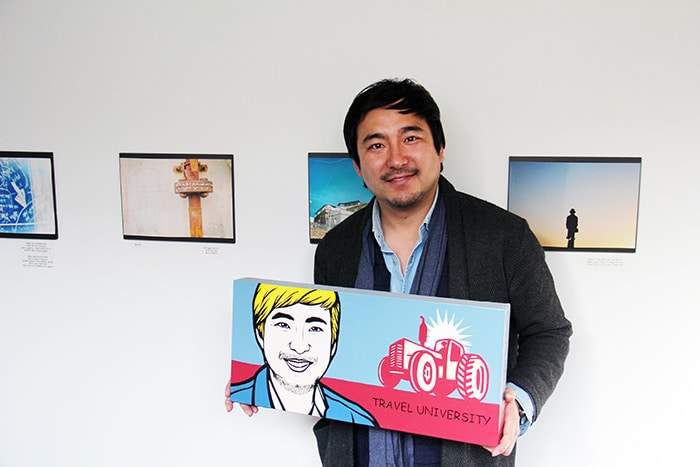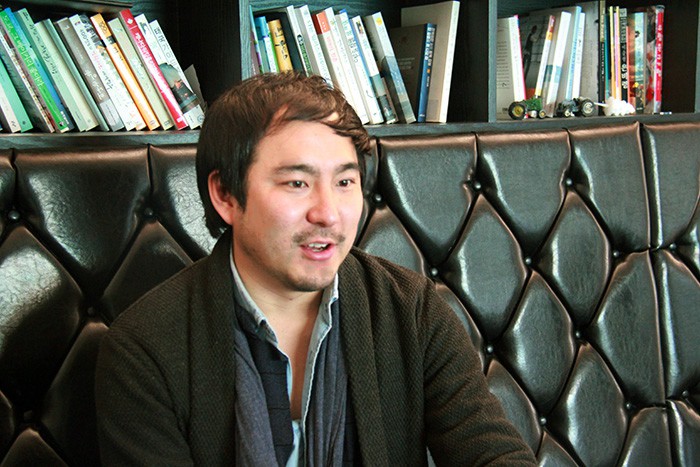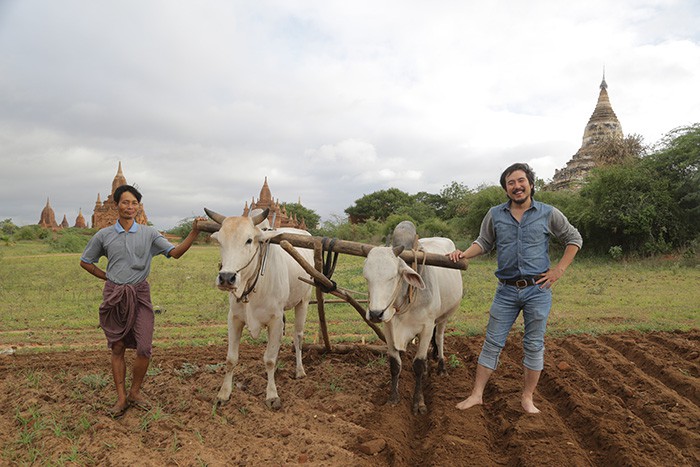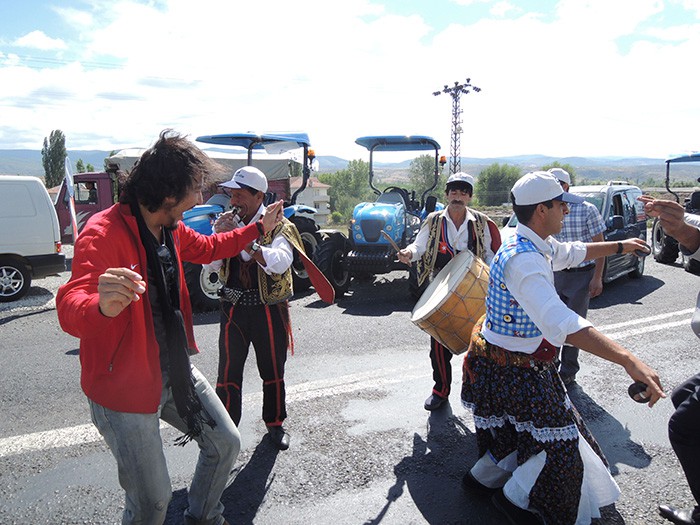
Kang Kitae, who traveled around rural Korea, China, Turkey and Myanmar on a tractor, provides lecture in his own lecture hall, called the Travel University, for other aspiring world travelers.
Kang Kitae, a 34-year-old traveler, is all set to go as long as he has a tractor to ride. The first traveler in Korea to travel on a tractor was born in Hadong, a farming area in Gyeongsangnam-do Province. He went to Jinju, a nearby city for a better education and finally went to the Korea National University of Education in Cheongju, Chungcheongbuk-do Province, and majored in physical education.
In September 2008, he went on his first tractor journey for six months without spending a penny. In 2012, he traveled around Turkey on his tractor. He headed to China and Myanmar in 2013. He then established his Travel University, a lecture hall where he shares his experience with visitors one and all.
The lecture hall is located in Malli Market, an old market near Seoul Station. Its entrance is decorated with a world map and phrases that encourage travelers to head out into the beyond. Here, 18 lectures, including “How to take photos during a trip,” “Make a book out of your trip” and “Travel around the world on a bicycle,” are taught to those who want to make the most out of their experience.
On March 22, Korea.net sat down with Kang Kitae at the Travel University to hear more about his journeys.

Kang Kitae shares his experience in his lecture ‘Around the world on a tractor’ at the Travel University, a lecture hall in Malli-dong, Seoul.
-You studied at the Korea National University of Education. Why did you give up your stable job as a teacher and choose to travel on a tractor?
It wasn’t my original plan to travel on a tractor. I thought that getting good grades in school and then getting a reliable job was the proper way to be a good son. I did well in school, and I was even elected as president of the student council. I entered university, but I didn’t feel like I belonged there. That’s why I went on a trip. I tried travelling on a bicycle and then I went backpacking to Southeast Asia and Central America. After a series of trips, I thought, “I need to see more of the world,” and that, “I need to go out to a broader world.” Like those ahead of me did on foot, in a car or on a motorcycle, I wanted to make my trip unique. Since I’m the son of a farmer, I thought a tractor might suit me.
-Wasn’t there opposition from your parents?
Everybody around me tried to dissuade me. I told my parents about my plans for 10 years. I told them that I won’t ask for money from them, I’ll write a book and give lectures after my trip, and I’ll even study abroad with the money. They didn’t buy it all at first. However, after I made my dreams come true, one by one, my father said, “Do as you wish, for your life is yours.” My professors thought I was weird. However, I’m one of their favorites at alumni meetings these days.
-Weren’t you afraid about your uncertain future?
I was quick to admit that my life is very unstable. If I thought I might fail, I just gave up. Then I tried a different way or put it off until later and went on to another task.

Kang Kitae poses atop his tractor during a trip in Turkey in 2012.
-Isn’t riding on a tractor uncomfortable?
Not at all. It’s actually quite comfortable. At first, it might be irritating because a tractor can only run at about 30 kph at its fastest. However, people are quick to adjust. Also, you can hang a trunk at the back of the tractor to carry food, utensils, clothes and other things. Moreover, driving it is super easy. You can learn to drive it in just five minutes. Because of its slow speed, there are no worries about a car crash.
-How did you give presentations to get your tractor sponsored?
I had no experience about giving presentations. I just heard that Steve Jobs was very good at convincing others, so I read the book “The Presentation Secrets of Steve Jobs.” Jobs wore a black turtleneck and jeans and he presented a white product on a black background. It helped people to focus. I followed his examples and put a picture of a tractor on a black background. I even used his script and changed the name of the product to “tractor.” I was confident because I thought that I was giving the best presentation in the world. Thanks to that, I could answer the questions very well, too.
-How many towns have you traveled to in Korea?
If I had only visited a few, I would have counted them. However, I stopped at so many places that I can’t count. I think I went to at least 50 cities, and that means I visited at least 250 towns. When I travelled inside Korea, I didn’t make any specific plans. I only chose the destination, like, “I’ll travel from Hadong, Gyeongsangnam-do Province, to Busan.” I then made other decisions on the spot. It was usually whether I was curious about a place or not. I didn’t move in one straight direction, but I went here and there.
I think all journeys are like that. Even if you make plans ahead, things can always happen unexpectedly and you can end up somewhere else.
-It must not be easy for a stranger to ask to camp on someone else’s land.
My father has been working as a village foreman for 27 years. Since when I was very young, I made announcements for the town or helped the people who visited my house. When an elderly woman visited when my father wasn’t around, I was the one to ask her if her daughter had gotten married or if her son was well, to keep her company. Because of such experience, it’s not very difficult for me to ask for favors of a stranger.
-Did you make a lot of friends during your trip?
I have lots of friends who live in the countryside. When I travel, I encounter new people, but I also revisit people that I met before.
For example, I’m an honorary resident of Jinbo-myeon Village in Cheongsong-gun, Gyeongsangbuk-do Province. When there’s a wedding or a funeral in Jinbo-myeon, I’m always a guest. The owners of bathhouses, billiard saloons, small restaurants and cafés are all my friends.
-Are you married?
Not yet but I really want to be. Please tell your readers that I am up for a blind date!

Kang Kitae helps a farmer in Myanmar plow his field with cows, during his trip to the country on a tractor.


Kang Kitae meets local farmers during his trip to rural Turkey.
-You have been to China, Turkey and Myanmar so far on a tractor. Have you ever felt threatened as a foreigner?
On the contrary, I was the one who scared the locals.
Imagine you’re a farmer, busy working, and a dirty guy with a mustache shows up on a tractor with flags all over it. You’d look at me and ask, “Who the hell is that?”
I was very comfortable, indeed. When I identified myself as a farmer or as the son of a farmer, they all welcomed me. Also, in Myanmar I was envied because many farmers still use oxcarts instead of tractors.
-As the son of a farmer, what did you feel after talking to farmers in other countries?
In China and Turkey, the farmers were certainly different from those in Korea. Because they have larger plots of land and agriculture is a larger part of the economies there, being a farmer is nothing of which to be ashamed. Most of the land in both countries outside of the downtown areas was farmland. I could feel they were proud of themselves.
Also, farmers were younger there. Many worked on the farm instead of going to high school or university. From what I saw, the whole perception of farming was different.
-In Korea, the rural population is aging and the agriculture industry suffers from a labor shortage. However, in the cities, the youth unemployment rate is over 10 percent. Do you have any solution to this dichotomy?
I have an idea. Someone should make a smartphone app that uses a big community, like the National Agricultural Cooperation, to connect young people and farmers. When farms post how many people they need, what kind of labor they need, how much they will pay, and how long they need the labor, people could then sign up for what they want. They could travel to another farm with the money they earn, and it’s a new journey. If this could be actualized and invigorated, farming villages would be less short-handed in terms of labor.
-Which place is most memorable for you?
Cappadocia in Turkey was beautiful. The nature there was like nothing I’ve ever seen in Korea. I did nothing but drink beer and appreciate the scenery from atop a mountain. I want to go there again on my honeymoon. I also met some of my closest friends there. I met a Korean couple at a local restaurant there and we still hang out occasionally.

Kang Kitae travels around rural areas, not only in Korea but also in Turkey, China and Myanmar, to meet farmers from around the world.
-What are your plans for the future?
I will continue my journeys on tractors. I want to go to South America this coming winter. I also want to cross Canada and the U.S. from Alaska to Los Angeles.
Moreover, I want to try living in different cities for a month. I asked other travelers which city was the best place they’ve found for this, and Copenhagen in Denmark, Dublin in Ireland, the whole state of Alaska in the U.S., Vancouver in Canada and Buenos Aires in Argentina are on my list.
One more thing I want to do is to make agricultural policies. If not for all of Korea, just for my hometown of Hadong is fine. The first thing I want to do is to make schools for children in rural areas to experience many things while playing.
By Wi Tack-whan, Kim Young Shin
Korea.net Staff Writers
Photos: Kim Young Shin, Kang Kitae
ysk1111@korea.kr







![[K-brand-promoting ethnic Koreans ⑤] Spreading taekwondo ‘spirit’ in Singapore](https://gangnam.com/file/2024/02/20231129124433000_ENU3D0FB-218x150.png)















